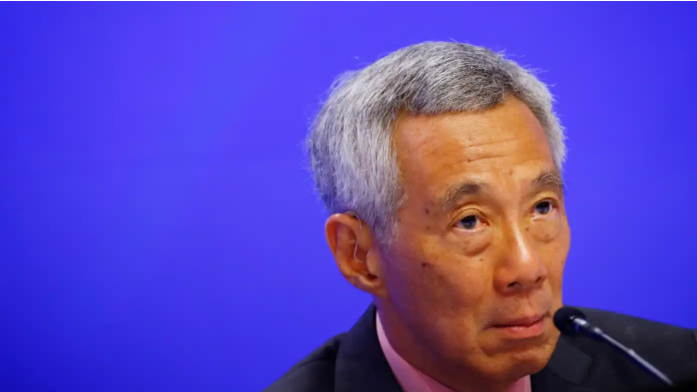SINGAPORE – The ruling People’s Action Party of Singapore is walking on thin ice in light of a series of political controversies involving high-profile politicians who were expected to have played a big role in the country’s next chapter of leadership.
From a graft probe on a cabinet minister to the resignation of a senior official over an extramarital affair, the rare political drama highlights the challenges Prime Minister Lee Hsien Loong faces in executing his carefully tailored succession plan.
On Wednesday, the city-state’s Parliament convened for the first time since the political incidents surfaced, prompting Lee to explain the issues.
“Such incidents involving ministers are rare, and there is no rule or precedent on how to effect an interdiction on a political office holder,” Lee told Parliament, referring to the case of Transport Minister S. Iswaran, who was arrested by the country’s anti-corruption agency on July 11.
Lee said Iswaran, who was later released on bail, has been suspended from duties, and his monthly pay was cut to 8,500 Singapore dollars ($6,300) until further notice, well below the benchmark level of a minister’s monthly salary of SG$55,000.
The anti-corruption agency has not disclosed the nature of the investigation and has not charged or convicted Iswaran. Lee said that investigations were “still ongoing” and that he was unable to provide more details on the case “so as not to prejudice the investigations in any way.”
Shortly after Iswaran’s arrest, Tan Chuan-Jin, a former cabinet member once touted as an up-and-coming member of the next generation of leaders, stepped down as speaker of Parliament and left the PAP over an affair with another party member.
Lee said on Wednesday that in hindsight, after learning of the affair between the two PAP members in November 2020, he should have “forced the issue sooner.” He added that he had “placed much weight on protecting their families, perhaps too much.”
The party’s unbroken rule over nearly six decades has been largely credited to its track record of the country’s development and its clean image. But as the economy slows, coupled with other challenges, including an aging population and geopolitical tensions, the party’s foundations have grown weaker, and the collapse of its clean image would be a blow to its administration.
“Singaporeans don’t feel that they are going forward economically or socially and haven’t done [so] for a decade or more,” said Michael Barr, an associate professor at Australia’s Flinders University. “The image of good, stable and effective government overseen by good people is now in serious doubt.”
“One immediate political impact is that the government’s preparations for a very early general election have undoubtedly died in a ditch,” Barr told Nikkei Asia, adding that the current Parliament could run its full five-year term until late 2025.
As the PAP holds nearly 90% of the seats, a change of government is highly unlikely in the next general election. But in the last election in 2020, the opposition won a record 10 seats, reflecting voters’ declining confidence in the ruling party.
The following general election is particularly crucial for the PAP, as it is expected to coincide with a carefully tailored succession project by Lee, who has been the country’s third prime minister since 2004. Deputy Prime Minister Lawrence Wong is expected to succeed Lee as prime minister as the leader of the PAP’s “fourth-generation” or “4G” team.
Meredith Weiss, a professor of political science at the State University of New York in Albany, said Lee has sought to boost confidence in the ascendant 4G leadership over the years. But “none of these incidents can help” the succession plan.
“Were the 4G leaders more overtly different from Lee et al., or were their ascent more organic — driven less through opaque party mechanisms than via popular mandate — the new guard might be able to make a case for renewal and change,” Weiss said. “But indeed, it is the very promise of reliable continuity that sustains the PAP’s still-strong mandate.”
Chong Ja Ian, an associate professor at the National University of Singapore, said the timing of the succession will depend on how Lee and the next generation of leaders handle the political setbacks.
“Should the fourth-generation leader under Wong demonstrate initiative and decisiveness in ownership,” Chong said, “and putting forward a reform plan that addresses the underlying issues leading to the challenges that have come up, there could be greater confidence in their leadership.”
“That could pave the way for the fourth-generation leaders to take over,” he added.
In a BBC interview last week, Wong said the recent incidents are “a setback” for the ruling party and the government. “I have no doubt that we will reflect, learn from these experiences, make our system better and continue to uphold the trust that Singaporeans have in the elected government and in our system of government,” he said.
“The PAP has taken a hit” over the issue, Lee said in Parliament on Wednesday. He tried to reassure that the PAP, including the future leaders, will handle the matter in accordance with the law even if it may be “politically embarrassing and painful to the party.”
“This is my approach, and I’m confident it will be my successor’s approach, too,” Lee said. “And this is how we will keep Singapore safe, strong and prosperous for many years to come.”
Additional reporting by Dylan Loh.






